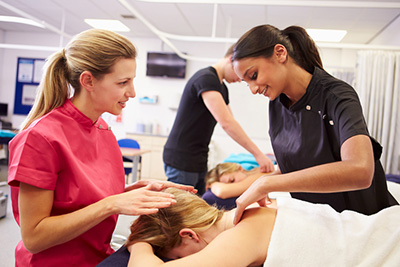
By Allissa Haines
Michael and I were just at the World Massage Festival with ABMP and it was a pleasure to talk to so many MTs taking an enormous variety of classes throughout the event. I made it a point to ask what classes people were taking and what they enjoyed (and didn’t) about each class.
The topic intrigues me because I have a love/hate relationship with in-person massage continuing education, born of my three-fold experience with CE. I’ve been a student, an instructor, and (most informative for me) a conference planner responsible for the experience of many students and instructors.
Over the years I’ve learned why people have both horrible and fantastic education experiences (often in the same class). Here are my tips for making sure you get the best experience possible.
Do the Research
Before you register, find out everything you can about the course.
- How big is the class?
- Is the workbook provided?
- What is the percentage of lecture time versus hands-on time?
- Will you be practicing in pairs or triples?
- Will you need to buy any special equipment or supplies to practice the techniques you learn?
Talk to people who have taken classes with the educator and get their feedback about how the class was run and the skills they gained.
Consider whether the format of the class matches your learning style and whether the information will help you treat your ideal (target) clients more fully and effectively. It could be the best Spa Treatments class in the world, but if the bulk of your work is treating athletes onsite at sporting events, it may not be the best investment of your time and money.
If it matters to you, be sure the course meets any CE course criteria you may need for your licensure renewal or memberships.
Budget
Consider all the costs, including:
- Tuition
- Transportation
- Lodging
- Food
- Additional training videos or books
Think about the supplies or equipment you may need to purchase to practice the techniques (hopefully you found that out in your Research stage) and whether you’ll be able to do that right after the class or plan out a little longer.
Prepare
Find out what anatomy or physiology you should review ahead of time, then actually do that. For reals. Schedule time to study for the few weeks leading up to the class and be sure you have the books or resources you need to do so.
Be Early
If you need to sit toward the front or back or by the door to be cozy, get there early so you can set up where you need to be. If you are at a large event, expect the lines for coffee or breakfast to be long and plan ahead for that.
Leave Your Ego
Drop your own ego at the door and don’t bother with any big egos around you. I’m sure we’ve all been in this situation: your partner talks through the hands-on practice time telling you all about how she works on Olympians/Fortune 500 CEOs/professional ballet dancers and how busy and successful she is. Meh. Blech. Shhhhhh. Right? I used to engage with these people. I used to get insecure and feel like I needed to trumpet my own success stories. Oh, ego. You’re so sly.
Now I realize this isn’t a competition, it’s a class. And it’s a waste of time to try to one-up each other. Big talkers get a polite, “Wow! How great for you! Hey, is it cool if I try that SCM move again?”
Bring Your Patience
Accept that you won’t master it all after one demo, one attempt, one day. Be patient with yourself. It took me until my mid-30s to realize I’m a slow learner. I need to see a technique, try it in class, see it again, try it when I’m back in my comfort zone (my office with my clients), and then casually practice it for a few months before I actually get it.
Maybe you’re a fast learner and love to move quickly. Be patient with your classmates who need a little more time with the questions and demos.
Speak Up
If you’re not happy with any part of the experience, speak up sooner rather than later. If your partner is stabbing you with their elbow and won’t let up even after you ask for mercy, switch partners. If the instructor isn’t using the microphone and you can’t hear them, chances are others can’t hear them either. Say something so the issue can be resolved.
You paid for a class. Communicate well so it meets your expectations, and do your best to be flexible when educators and hosts creatively solve the problems that will (inevitably) pop up.
Practice!
If you loved your class and think the techniques can be useful to your clients, use those new skills quickly and get feedback.
And stay tuned for my next blog post on how to practice and integrate those new techniques into your business.
Allissa Haines runs a massage practice and collaborative wellness center in Massachusetts. She partners with Michael Reynolds to create business and marketing resources for massage therapists like you at www.massagebusinessblueprint.com.